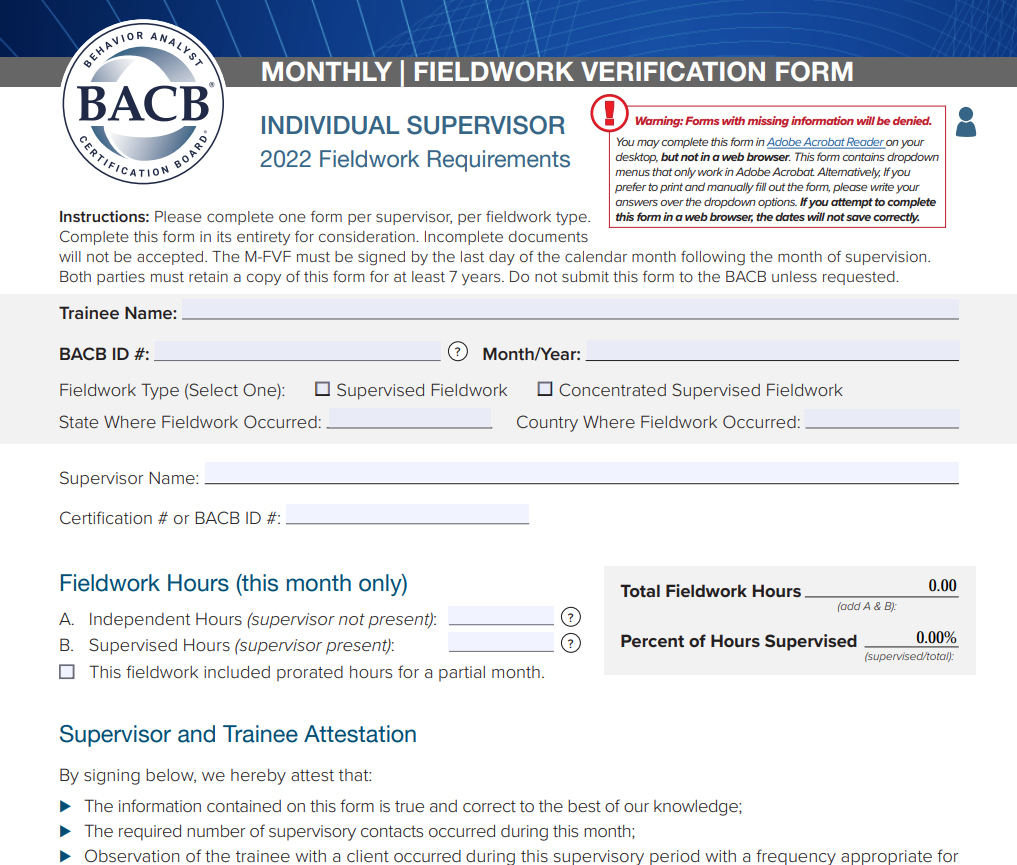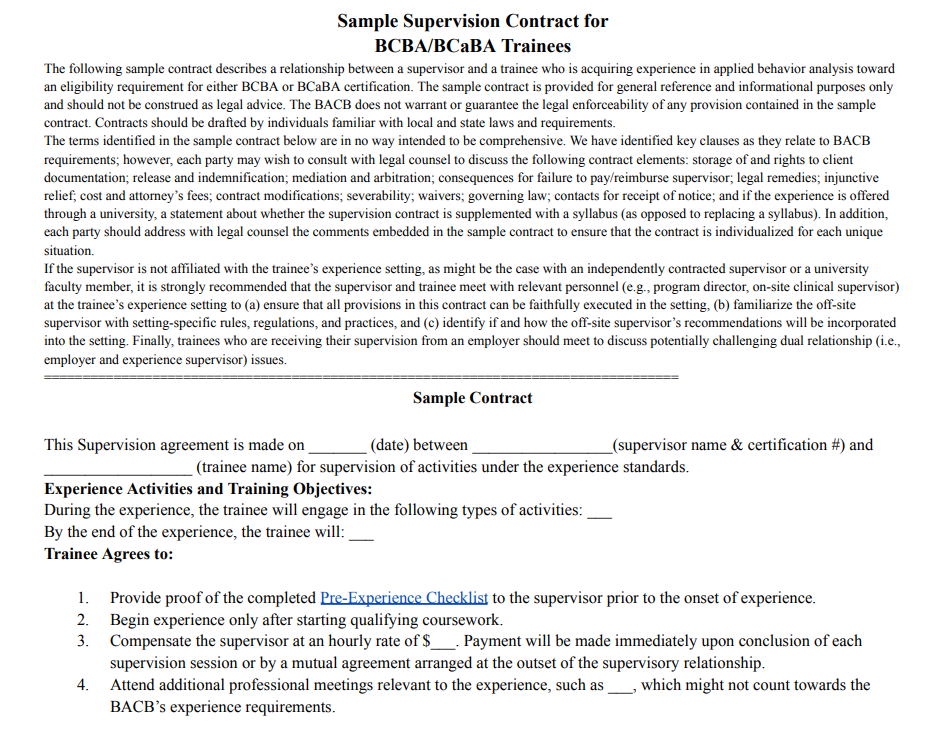
My
introduction to getting my supervised fieldwork hours to be eligible
for the board certified behavior analyst (BCBA) exam was…. not great. I
transitioned out of the Army and ended up in an area that, at that time,
had shockingly few options for gaining BCBA supervision. I started
working at a clinic as a registered behavior technician (RBT) under a
supervisor I respected- I felt like this would be the place where I
would get my BCBA certification. Until one of my paychecks was late.
Then another. I couldn’t justify driving to the clinic without money for
gas- and I couldn’t stop seeing clients who needed my services. I was
in a terrible position. I did accrue hours under this supervisor, but I
did not get a single one documented. And we know in the field- if it
isn’t documented it didn’t happen. I lost those hours. Time and time
again I hear stories of BCBAs who had similar experiences to me.
Starting out in the field we are pretty vulnerable. Nobody tells
trainees that they should interview their BCBA supervisors as if their
careers depend on it- because it does. Nobody sits down and explains
everything you need to know to become a BCBA and walks us through the
process of finding an amazing supervisor. Sometimes, we don’t even have
access to quality supervisors to work with! So we end up losing hours.
Not getting paid. Not getting well-rounded supervision. Sometimes giving
up our dreams of becoming a BCBA.
My story has a happy ending- I found two amazing supervisors at one
organization. The first was intelligent and compassionate. She truly
loves her clients and worked heavily on goal acquisition and
programming. The other was a riot, hilarious and friendly- he also
worked in a residential setting and left us in awe with his stories of
behavior reduction strategies and wild functional behavior assessments
on the fly. However, I cringe when I think about what could have
happened. What if I didn’t find my supervisors? How long would I have
stayed at a place that wasn’t ideal due to geographic isolation? At that
time, I was unaware of remote supervision- I’m not even sure if it
existed at the time. I couldn’t supplement any of my hours online or
find a supervisor utilizing an online marketplace.
Now, as an experienced BCBA and a supervisor myself- I have a voice
that I would like to use to help others who might be in a similar
situation as I was. Here is what you need to know when you are looking
for quality supervision:
INTERVIEW YOUR SUPERVISOR LIKE YOUR CAREER DEPENDS ON IT
Before being a supervisory experience- interview your BCBA!
Are
you interested in early intervention? Ask them about the youngest
clients they see- and what assessments they prefer to use. Want to get
into school consultation? Ask about your supervisor’s relationship with
the local schools and if they attend IEP meetings. Are you a tech whiz
talking to a BCBA who prefers paper and pencil?
In short, is this BCBA someone you would like to model your career after?
It
is ideal to have a one-on-one meeting about what you are looking for in
a supervisor- treat it like a job interview for both parties. It’s
better to spend some time at the onset of a supervision relationship to
get an idea of expectations than to have to have an uncomfortable
conversation later on because the supervision isn’t working out. And
remember- if the BCBA you are considering working with isn’t open to
being interviewed- they probably aren’t the one you want to work with.
MAKE SURE YOU HAVE A SOLID SUPERVISION CONTRACT
This is so important. Take the time to familiarize yourself with the
behavior analyst certification board (BACB) recommendations on
supervision contracts. Fortunately, they offer a sample supervision
contract here: https://www.bacb.com/wp-content/uploads/2020/05/Sample-Supervision-Contract-1.docx.
A supervision contract MUST be in place before you accrue any hours-
not having one can cause you to lose hours that you’ve earned. This
should outline everyone in the supervisory relationship’s
responsibilities, expectations, and documentation that will be used.
This is also a great time to talk about restricted vs. unrestricted
hours and the activities that will be used to earn these hours over the
course of your supervised fieldwork. Don’t be afraid to speak up and ask
questions about your contract or have a third party check it out before
you sign.
DON’T BE AFRAID OF THE BACB HANDBOOK
Sometimes looking at documents for the first time can be really
overwhelming. However, the behavior analyst certification board’s BCBA
handbook is really something you should familiarize yourself with on
your supervision journey. It outlines everything you need to know about
getting and keeping your BCBA certification. Use it as a guide to ensure
that you can confidently gather and document hours for your supervised
fieldwork. It is totally fine to let your supervisor know you have
questions- and would like to refer to the BCBA handbook before making a
decision about supervision.
LOOK AT REMOTE SUPERVISION OPTIONS
Like I said earlier, when I was going through my supervision
experience, I was unaware of remote supervised fieldwork. This could
have solved the issue of limited supervisors in my area by allowing me
to find a supervisor marketing their supervision from anywhere in the
world. Even after finding my two amazing supervisors, supplementing my
hours with a remote supervisor would have been a really great way to get
more experience. With more supervisors I would have been exposed to
more shared experiences with professionals who have been in the field
longer than me. Additionally, having remote supervisors could have
allowed me to get my supervised fieldwork quicker since I would have
been able to gather more ideas and tasks for unrestricted hours.
I hope my thoughts on the things I wished I knew when I started out
have been helpful. It would be amazing for the not-so-great experiences I
had to help someone else avoid them in the future. Leveraging the BCBA
handbook, your interview skills, remote options, and a clear supervision
contract can help guide you to amazing supervisors who will support you
throughout your journey to becoming a BCBA.
References
Behavior Analyst Certification Board. (2023). Board Certified Behavior Analyst® Handbook. bacb.com. https://www.bacb.com/wp-content/uploads/2022/01/BCBAHandbook_231227-a.pdf
Comments (0)
Categories
Recent posts


Key Facts About ABA Services in Ontario
9 Oct 2024
Sample Supervision Contract
17 Jul 2024
BCBA Fieldwork: Is Remote Supervision ...
30 Jun 2021



